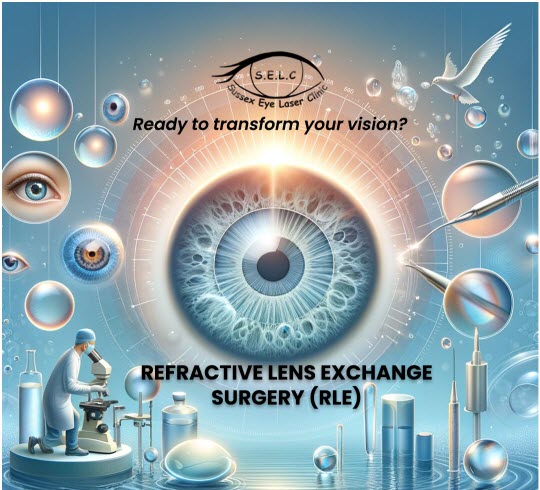Refractive Lens Exchange (RLE) stands as a transformative solution for individuals grappling with near-sightedness, farsightedness, presbyopia, or early-stage cataracts. Offering an alternative to traditional LASIK procedures, RLE boasts impressive outcomes, often reducing or eliminating the reliance on glasses or contact lenses. As you embark on your journey towards clearer vision through RLE, understanding the postoperative experience is paramount for a smooth and successful recovery.
Unveiling the Procedure: Refractive Lens Exchange involves the implantation of a plastic intraocular lens (IOL) to replace the eye’s natural lens. These IOLs come in various types, each catering to specific vision needs:
Multifocal IOLs: Designed with built-in bifocal correction, enabling clear vision at both near and far distances.
Extended depth of focus IOLs: Designed to give clarity of vision from distance to the intermediate range and functional near vision.
Monovision IOLs: Optimize distance vision in the dominant eye while preserving near vision in the non-dominant eye.
Day of Surgery: What to Expect
On the day of your RLE procedure, you’ll undergo a brief outpatient surgery under local anaesthesia. After numbing drops are administered, sterile coverings are placed around your eye, ensuring aseptic conditions. With your eye held open by an eyelid holder, the surgeon makes a small incision and utilizes ultrasound to fragment and remove the natural lens. The chosen IOL is then implanted, and the incision is closed, followed by the placement of a protective shield over your eye.
Recovery Journey: Navigating the Postoperative Phase
Following RLE surgery, immediate improvements in vision are often noticeable. While the procedure itself is not painful and does not require sedation, you’ll need someone to drive you home afterward. Most patients can resume normal activities, including driving, within a week after surgery. However, complete vision correction may take several weeks to manifest fully.
During the recovery period, you may encounter temporary side effects such as blurred vision, glare, halos, and mild discomfort. It’s essential to follow your surgeon’s postoperative instructions diligently, including the use of prescribed eye drops and attending scheduled follow-up appointments.
Unique Advantages of RLE:
Unlike laser surgery, RLE does not alter corneal thickness, mitigating the risk of certain complications. Additionally, RLE eliminates the need for future cataract surgery, offering permanent vision correction even as age-related changes occur.

Is RLE Right for You? Exploring Candidacy Criteria:
RLE is suitable for individuals aged 45 and above or have recently felt the need for reading glasses, with stable vision and no history of significant vision changes in the past six months. Ideal candidates are typically over the age of 40 and may have corneal abnormalities or severe refractive errors that make LASIK less suitable.
FAQs - Refractive Lens Exchange
How long does it take to recover fully from RLE surgery?
While immediate improvements in vision are often noticeable, complete recovery may take several weeks. Most patients can resume normal activities, including driving, within a week after surgery.
Is RLE permanent, or will I need additional procedures in the future?
RLE offers permanent vision correction, eliminating the need for future cataract surgery. The procedure addresses age-related changes in vision, ensuring long-lasting results.
What factors determine eligibility for RLE surgery?
Eligibility for RLE depends on various factors, including age, stability of vision prescription, absence of eye disease, and suitability based on individual ocular characteristics.
Can RLE correct both near-sightedness and farsightedness?
Yes, RLE can correct a wide range of refractive errors, including both near sightedness and farsightedness. However, specific risks may be associated with certain conditions, such as myopia, which increases the risk of retinal detachment during surgery.
Conclusion:
Refractive Lens Exchange (RLE) offers a promising path to clearer vision and enhanced quality of life for individuals seeking freedom from glasses or contact lenses. By understanding the recovery process and exploring candidacy criteria, you can embark on your RLE journey with confidence, knowing that brighter, clearer vision awaits. If you’re ready to embrace a life without visual limitations, consult with our experienced team to determine if RLE is the right choice for you.
